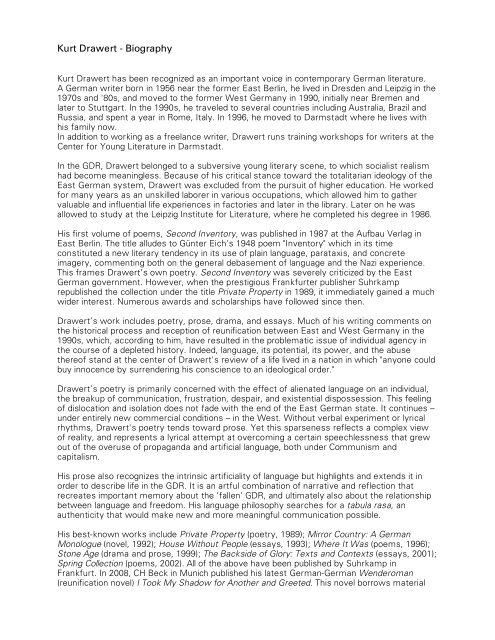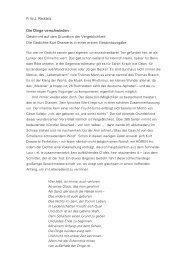You also want an ePaper? Increase the reach of your titles
YUMPU automatically turns print PDFs into web optimized ePapers that Google loves.
<strong>Kurt</strong> <strong>Drawert</strong> - <strong>Biography</strong><br />
<strong>Kurt</strong> <strong>Drawert</strong> has been recognized as an important voice in contemporary German literature.<br />
A German writer born in 1956 near the former East Berlin, he lived in Dresden and Leipzig in the<br />
1970s and '80s, and moved to the former West Germany in 1990, initially near Bremen and<br />
later to Stuttgart. In the 1990s, he traveled to several countries including Australia, Brazil and<br />
Russia, and spent a year in Rome, Italy. In 1996, he moved to Darmstadt where he lives with<br />
his family now.<br />
In addition to working as a freelance writer, <strong>Drawert</strong> runs training workshops for writers at the<br />
Center for Young Literature in Darmstadt.<br />
In the GDR, <strong>Drawert</strong> belonged to a subversive young literary scene, to which socialist realism<br />
had become meaningless. Because of his critical stance toward the totalitarian ideology of the<br />
East German system, <strong>Drawert</strong> was excluded from the pursuit of higher education. He worked<br />
for many years as an unskilled laborer in various occupations, which allowed him to gather<br />
valuable and influential life experiences in factories and later in the library. Later on he was<br />
allowed to study at the Leipzig Institute for Literature, where he completed his degree in 1986.<br />
His first volume of poems, Second Inventory, was published in 1987 at the Aufbau Verlag in<br />
East Berlin. The title alludes to Günter Eich's 1948 poem "Inventory" which in its time<br />
constituted a new literary tendency in its use of plain language, parataxis, and concrete<br />
imagery, commenting both on the general debasement of language and the Nazi experience.<br />
This frames <strong>Drawert</strong>’s own poetry. Second Inventory was severely criticized by the East<br />
German government. However, when the prestigious Frankfurter publisher Suhrkamp<br />
republished the collection under the title Private Property in 1989, it immediately gained a much<br />
wider interest. Numerous awards and scholarships have followed since then.<br />
<strong>Drawert</strong>’s work includes poetry, prose, drama, and essays. Much of his writing comments on<br />
the historical process and reception of reunification between East and West Germany in the<br />
1990s, which, according to him, have resulted in the problematic issue of individual agency in<br />
the course of a depleted history. Indeed, language, its potential, its power, and the abuse<br />
thereof stand at the center of <strong>Drawert</strong>'s review of a life lived in a nation in which "anyone could<br />
buy innocence by surrendering his conscience to an ideological order."<br />
<strong>Drawert</strong>’s poetry is primarily concerned with the effect of alienated language on an individual,<br />
the breakup of communication, frustration, despair, and existential dispossession. This feeling<br />
of dislocation and isolation does not fade with the end of the East German state. It continues –<br />
under entirely new commercial conditions – in the West. Without verbal experiment or lyrical<br />
rhythms, <strong>Drawert</strong>'s poetry tends toward prose. Yet this sparseness reflects a complex view<br />
of reality, and represents a lyrical attempt at overcoming a certain speechlessness that grew<br />
out of the overuse of propaganda and artificial language, both under Communism and<br />
capitalism.<br />
His prose also recognizes the intrinsic artificiality of language but highlights and extends it in<br />
order to describe life in the GDR. It is an artful combination of narrative and reflection that<br />
recreates important memory about the ‘fallen’ GDR, and ultimately also about the relationship<br />
between language and freedom. His language philosophy searches for a tabula rasa, an<br />
authenticity that would make new and more meaningful communication possible.<br />
His best-known works include Private Property (poetry, 1989); Mirror Country: A German<br />
Monologue (novel, 1992); House Without People (essays, 1993); Where It Was (poems, 1996);<br />
Stone Age (drama and prose, 1999); The Backside of Glory: Texts and Contexts (essays, 2001);<br />
Spring Collection (poems, 2002). All of the above have been published by Suhrkamp in<br />
Frankfurt. In 2008, CH Beck in Munich published his latest German-German Wenderoman<br />
(reunification novel) I Took My Shadow for Another and Greeted. This novel borrows material
from the famous Kaspar Hauser legend, a foundling who was isolated and marginalized, and<br />
who symbolizes estrangement from society, language, and religion (ideology). Kaspar Hauser<br />
also reflects the very narrow spectrum of human emotion displayed by those around him. In<br />
<strong>Drawert</strong>’s novel, a neglected foundling narrates the demise of the GDR and the many ensuing<br />
changes in German society.<br />
In 2009, his play "The Opposite of Nothing at All" premiered in Darmstadt and Frankfurt in time<br />
for the 20 th anniversary of the fall of the Berlin Wall. The performance has been likened to<br />
Beckett’s Waiting for Godot, but adds a cynical twist while picking up on such diverse themes<br />
as the Berlin Wall, the financial crisis, and art history.<br />
<strong>Drawert</strong> has received many national and international literary awards, including the Leonce and<br />
Lena Prize, the Ingeborg-Bachmann-Prize, the Uwe-Johnson-Preis, Nikolaus-Lenau-Prize, and<br />
most recently the Rainer-Malkowski-Prize of the Bavarian Academy of Fine Arts. His work has<br />
been translated into several languages, including Polish, Italian, Romanian, Arabic, English, and<br />
French.<br />
2<br />
Books – Selection<br />
„Zweite Inventur“, poems, Aufbau Verlag, Berlin and Weimar 1987<br />
„Privateigentum“, poems, Suhrkamp Verlag, Frankfurt /Main 1989<br />
„Spiegelland. Ein deutscher Monolog“, novel, Suhrkamp Verlag,<br />
Frankfurt /Main 1992<br />
„Haus ohne Menschen. Zeitmitschriften“. Essays, Suhrkamp Verlag,<br />
Frankfurt /Main 1993<br />
„Revolten des Körpers“, Essays, Edition Solitude, Stuttgart 1995<br />
„Wo es war“, poems, Suhrkamp Verlag, Frankfurt/Main 1996<br />
„Alles ist einfach“, plays for theatre, 1997<br />
„Steinzeit“, plays for theatre, Suhrkamp Verlag, Frankfurt/Main 1999<br />
„Reisen im Rückwärtsgang“, Essays, Arche Verlag, Hamburg and Zürich 2000<br />
„Rückseiten der Herrlichkeit. Texte und Kontexte”. Essays, Suhrkamp Verlag,<br />
Frankfurt /Main 2001<br />
„Frühjahrskollektion“, poems, Suhrkamp Verlag, Frankfurt/Main 2002<br />
„Emma. Ein Weg“, Flaubert-Essay, with photos by Ute Döring, Sonderzahl-Verlag,<br />
Wien 2005<br />
„Ich hielt meinen Schatten für einen anderen und grüßte“, novel, Verlag C. H. Beck,<br />
München 2008.<br />
Besides: plays for theatre, publications, essays and translations<br />
Prices - Selection<br />
1989 Leonce-und-Lena-Price<br />
1991 Price of literatur by Jürgen-Ponto-Stiftung<br />
1993 Price of Poems, Meran, Italien<br />
1993 Ingeborg-Bachmann-Price, Austria<br />
1994 Uwe-Johnson-Price<br />
1995 Rom-Price, Villa Massimo, Italien<br />
1997 Nikolaus-Lenau-Price<br />
2000 Arno-Schmidt-Price<br />
2002 Schiller-Price<br />
2008 Rainer-Malkowski-Price<br />
2009 New-York-Price









